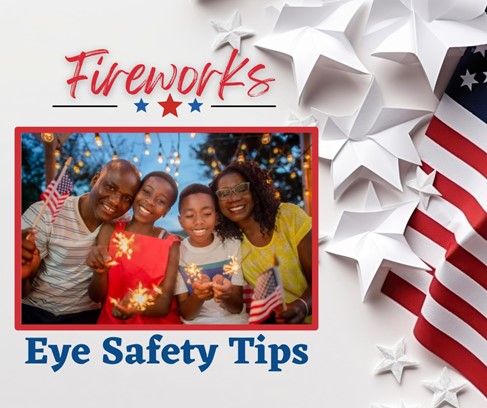Home » Blog » Fireworks Eye Safety Tips
Fireworks Eye Safety Tips
Posted by: Georgia Eye Associates in General

As Memorial Day, the official pre-summer kickoff holiday, approaches, it’s crucial to remember that fireworks can pose severe risks, potentially harming not just you but also your loved ones. Did you know that 65% of all fireworks injuries involve bystanders, and 19% of those injuries affect the eyes? These statistics underscore the need for caution and proper safety measures when handling fireworks, not just for your safety but for those around you.
Here are some safety tips from the American Academy of Ophthalmology that you should always follow if you plan to light fireworks at home. By adhering to these guidelines, you are not only ensuring your safety but also taking an active role in preventing potential injuries to yourself and those around you.
- Observe local laws and use consumer fireworks, which are typically smaller and less powerful than professional-grade fireworks.
- Wear protective eyewear. Fireworks-related eye injuries are typically a mix of blunt force trauma, heat burns, and chemical exposure.
- Do not allow young children to play with fireworks. Sparklers, a firework often considered the ideal “safe” device for the young, burn at very high temperatures, reaching up to [1200 degrees Fahrenheit]. This is hot enough to cause third-degree burns. Therefore, they should not be handled by young children. Children may not understand the danger of fireworks and may not act appropriately while using the devices or in emergencies.
- Set off fireworks outdoors in a clear area, away from houses, dry leaves, grass, and other flammable materials.
- Keep a bucket of water nearby for emergencies and for pouring on fireworks that fail to ignite or explode. This is crucial as it can prevent a tiny spark from turning into a full-blown fire.
- Do not try to relight or handle malfunctioning or “dud” fireworks. Soak them with water and throw them away.
- Be sure other people are out of range before lighting fireworks.
- Never light fireworks in a container, especially a glass or metal container.
- Keep unused fireworks away from firing areas, which are the designated spots where you light them. This is to prevent the accidental ignition of unused fireworks.
- Store fireworks in a cool, dry place. This is because heat and moisture can cause fireworks to become unstable, increasing the risk of accidents.
- Check instructions for storage directions.
- Never have any portion of your body directly over a firework while lighting.
- Do not experiment with homemade fireworks.
- If injured, get medical attention immediately. Do not apply ointments to burns or take pain medications while waiting for assistance.
Fireworks injure 10,500 people annually. If you experience a fireworks-related eye injury, the following tips will help:
- Seek medical attention immediately.
- Avoid rinsing or rubbing the eyes or applying pressure.
- Do not remove any object from the eye, apply ointments, or take any pain medication BEFORE consulting a medical professional.
Safety during fireworks displays is important to prevent serious eye injuries. Ensure you protect your eyes when enjoying fireworks during the summer holidays so that you can enjoy the fantastic displays for years to come.
We honor our troops and their families this Memorial Day!

References: American Academy of Ophthalmology, American Optometric Association, International Association of Fire Fighters, and National Fire Protection Association. The content is researched and vetted by the American Academy of Ophthalmology. American Optometric Association and Prevent Blindness. This blog provides information and discussion about eye health and related subjects. The content provided within this blog and any linked materials are not intended and should not be considered medical advice. If the reader or any person has a medical concern, they should consult with an appropriately licensed physician.
